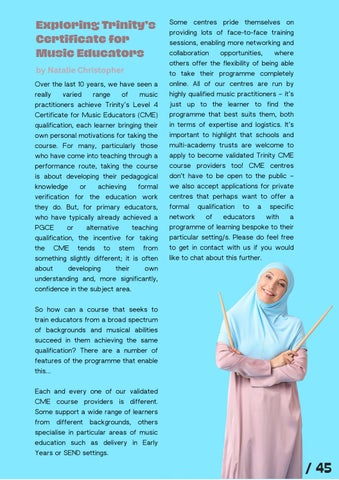Exploring Trinity’s Certificate for Music Educators by Natalie Christopher Over the last 10 years, we have seen a really varied range of music practitioners achieve Trinity’s Level 4 Certificate for Music Educators (CME) qualification, each learner bringing their own personal motivations for taking the course. For many, particularly those who have come into teaching through a performance route, taking the course is about developing their pedagogical knowledge or achieving formal verification for the education work they do. But, for primary educators, who have typically already achieved a PGCE or alternative teaching qualification, the incentive for taking the CME tends to stem from something slightly different; it is often about developing their own understanding and, more significantly, confidence in the subject area.
Some centres pride themselves on providing lots of face-to-face training sessions, enabling more networking and collaboration opportunities, where others offer the flexibility of being able to take their programme completely online. All of our centres are run by highly qualified music practitioners – it’s just up to the learner to find the programme that best suits them, both in terms of expertise and logistics. It’s important to highlight that schools and multi-academy trusts are welcome to apply to become validated Trinity CME course providers too! CME centres don’t have to be open to the public – we also accept applications for private centres that perhaps want to offer a formal qualification to a specific network of educators with a programme of learning bespoke to their particular setting/s. Please do feel free to get in contact with us if you would like to chat about this further.
So how can a course that seeks to train educators from a broad spectrum of backgrounds and musical abilities succeed in them achieving the same qualification? There are a number of features of the programme that enable this… Each and every one of our validated CME course providers is different. Some support a wide range of learners from different backgrounds, others specialise in particular areas of music education such as delivery in Early Years or SEND settings.
/ 45
